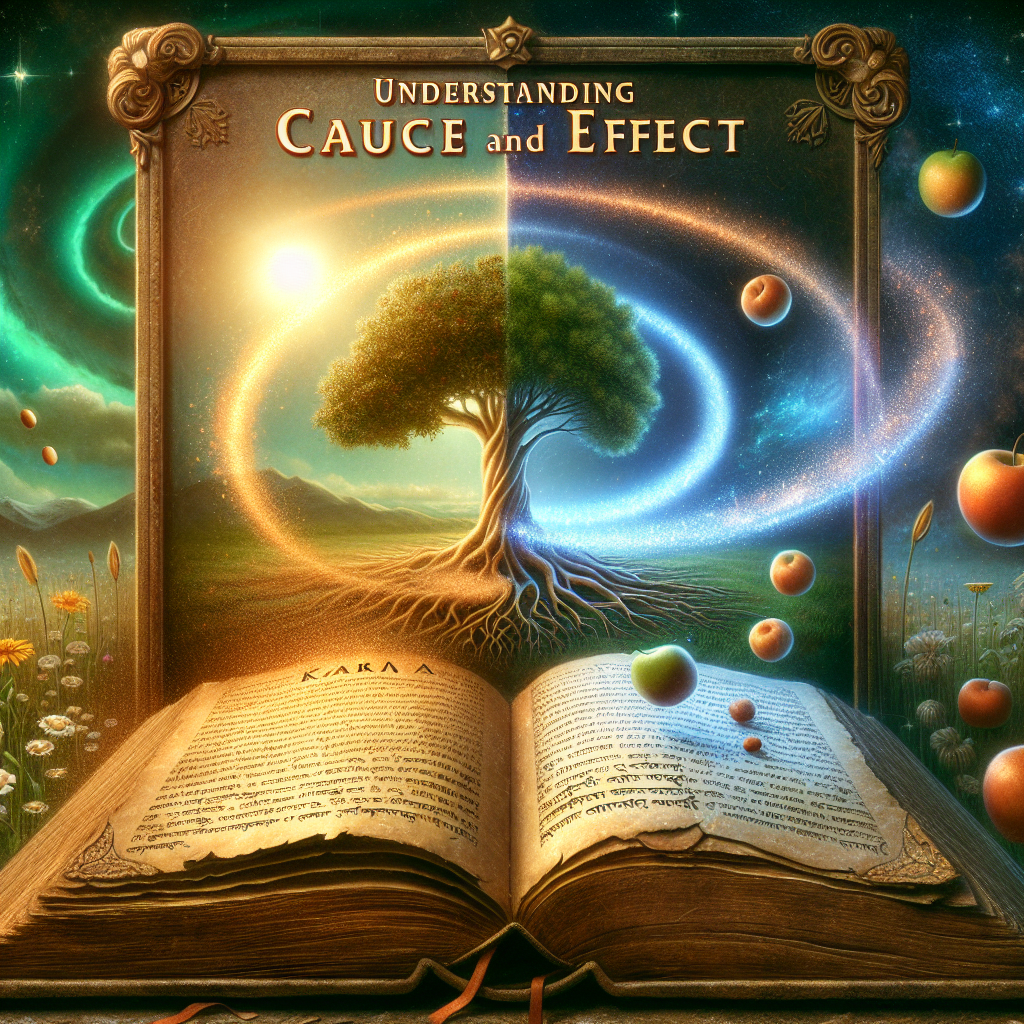Karma is a profound and often misunderstood concept that has its roots in ancient Indian philosophy and is central to several Eastern religions, such as Hinduism and Buddhism. The term ‘karma’ can be translated to mean ‘action’ or ‘deed’. However, it encompasses much more than just the actions themselves; it refers to the intentions behind those actions and the consequences that arise as a result.
What is Karma?
At its core, karma is the law of cause and effect. This principle posits that every action has consequences. When an individual performs an action, whether good or bad, that action creates energy that will eventually return to the individual either in this life or in future lives. This cycle can be understood in terms of:
- Intentions: The motivations behind actions play a crucial role in determining the type of karma created.
- Actions: Physical deeds or verbal expressions that manifest from one’s intentions.
- Consequences: The results of actions that affect the individual and potentially others.
In this way, every individual is responsible for their own karma, creating a deep sense of accountability and moral responsibility in their actions.
Historical and Cultural Context of Karma
The concept of karma dates back thousands of years and has been referenced in various texts and philosophies. Here are some historical contexts that shaped the understanding of karma:
1. Hinduism
In Hindu philosophy, karma is intricately linked with the concepts of reincarnation and dharma (duty). The Bhagavad Gita, a sacred text of Hinduism, elaborates on the importance of performing one’s duties without attachment to the outcomes. This idea emphasizes that one should act righteously regardless of the consequences, thereby cultivating good karma.
2. Buddhism
Buddhism, which arose from Hinduism, also embraces the concept of karma but places a stronger emphasis on the mental state and intentions that lead to actions. In Buddhism, karma is seen as a key element in the cycle of samsara, or the cycle of birth, death, and rebirth. Enlightenment is achieved by breaking free from this cycle through the understanding and transcendence of karma.
3. Jainism
Jainism takes a unique approach to karma, viewing it as a form of matter that interacts with the soul. According to Jain beliefs, accumulated karma can be purified through right action, right knowledge, and right faith. Avoiding harm to living beings is particularly emphasized, as this helps to avoid negative karma.
The Mechanics of Karma
To better understand how karma operates, it’s essential to look at its mechanics and underlying principles.
1. The Three Types of Karma
Karma can be categorized into three types, each representing a different aspect of actions and their consequences:
- Sanchita Karma: This is the accumulated karma from all past actions, both good and bad, that an individual carries into this life and future lives.
- Prarabdha Karma: This refers to the portion of karma that is currently being experienced in the present life, often as one’s present circumstances and experiences.
- Aagami Karma: This karma is created by actions performed in the present life that will affect future experiences.
2. Intentions and Actions
As previously highlighted, intentions are crucial to the concept of karma. Actions motivated by selfless intent create positive karma, while actions stemming from selfishness or harm create negative karma. In this sense, the same action can result in different karmic outcomes depending on the underlying intention.
3. The Role of Dharma
Dharma, or one’s duty and righteousness, plays a vital role in shaping karma. Fulfilling one’s dharma creates positive karma, while neglecting it can lead to negative repercussions. This understanding encourages individuals to act with integrity and a sense of moral purpose.
Karma in Practice
Understanding karma theoretically is one thing, but applying it in daily life can be challenging. Here are ways to embody the principles of karma:
1. Practicing Mindfulness
Being aware of your thoughts, actions, and intentions is essential for living a life in alignment with the principles of karma. Mindfulness practices such as meditation can help individuals recognize their intentions and create positive actions.
2. Engaging in Positive Actions
Consciously choosing to engage in acts of kindness, compassion, and helpfulness generates positive karma. Volunteering, providing support to others, and showing gratitude are practical ways to cultivate good karma in everyday life.
3. Accepting Consequences
Learning to accept the consequences of one’s actions, whether good or bad, is a crucial part of understanding karma. This acceptance can lead to growth, lessons learned, and improved future decision-making.
4. Cultivating Positive Intentions
Focus on developing positive intentions behind your actions. Before taking action, consider what we hope to achieve and whether that aligns with a compassionate and supportive mindset.
Debunking Common Myths about Karma
Despite its prevalence in popular culture, several misconceptions about karma persist. It’s important to address these myths to foster a clearer understanding of karma.
1. Karma is Punitive
A common misconception is that karma is solely about punishment for past wrongdoings. In reality, karma encompasses all actions and their consequences, including positive ones. It is less about retribution and more about balance and learning.
2. Karma is Immediate
Another myth is that karma operates instantaneously. In truth, the consequences of actions may take time to manifest and can occur across lifetimes, making it essential to maintain patience and faith in the process.
3. Karma is Deterministic
Some believe that karma creates a predestined path for individuals. However, while karma influences our experiences, it does not limit free will. Individuals still have the power to shape their future through their actions and choices.
The Interconnectedness of All Beings
A critical aspect of the law of karma is the interconnected nature of all beings. Every action not only affects the individual but also impacts the broader world and those around us. This understanding fosters compassion and empathy, as we come to realize our shared existence.
1. Collective Karma
Karma is not only an individual journey; entire societies, cultures, and communities can accumulate karma through their collective actions. Understanding this collective aspect encourages social responsibility and awareness.
2. Compassion in Action
Embracing the interconnectedness of life leads to a more compassionate approach to existence. Actions taken with the awareness of their impact can cultivate a positive ripple effect in the world.
Conclusion
Understanding karma goes beyond grasping a concept; it involves embracing a philosophy of life that encourages mindful actions and thoughtful intentions. The law of cause and effect teaches individuals to take responsibility for their actions, fostering a sense of accountability and moral integrity. Each moment presents an opportunity to create positive karma, thereby shaping a better future for ourselves and others.
As humanity continues to evolve, the principles of karma serve as a guiding light, reminding us that our choices matter and that compassion and kindness can ripple across the infinite tapestry of life.
FAQs
What is the origin of the word ‘karma’?
The word ‘karma’ comes from the Sanskrit word karman, which means ‘action,’ ‘deed,’ or ‘work.’
Is karma the same in all religions?
While the concept of karma is prominent in Hinduism, Buddhism, and Jainism, each tradition interprets it differently, particularly regarding the implications for individual behavior and the nature of consequences.
Can karma be changed?
Karma can evolve based on the actions and intentions that individuals choose to take. By engaging in positive actions and cultivating a compassionate mindset, one can change their karmic trajectory.
Does karma affect future lives?
In religions that believe in reincarnation, karma affects future lives, with actions in this life leading to consequences in future existences. However, interpretations vary across different philosophies.
How can I create positive karma?
Creating positive karma involves acting with good intentions, helping others, practicing compassion, and fulfilling your duties with integrity. Cultivating mindfulness also plays a crucial role in understanding your actions.
It seems like your message is incomplete. Could you please provide more details or specify the prompt you’re referring to? I’m here to help!, #Understanding #Karma #Law #Effect, #Understanding #Karma #Law #Effect, 1734998979, understanding-karma-the-law-of-cause-and-effect





